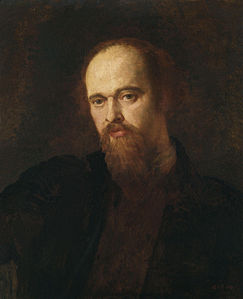Analysis of Soothsay
Dante Gabriel Rossetti 1828 (London) – 1882 (Birchington-on-Sea)
Let no man ask thee of anything
Not yearborn between Spring and Spring.
More of all worlds than he can know,
Each day the single sun doth show.
A trustier gloss than thou canst give
From all wise scrolls demonstrative,
The sea doth sigh and the wind sing.
Let no man awe thee on any height
Of earthly kingship's mouldering might.
The dust his heel holds meet for thy brow
Hath all of it been what both are now;
And thou and he may plague together
A beggar's eyes in some dusty weather
When none that is now knows sound or sight.
Crave thou no dower of earthly things
Unworthy Hope's imaginings.
To have brought true birth of Song to be
And to have won hearts to Poesy,
Or anywhere in the sun or rain
To have loved and been beloved again,
Is loftiest reach of Hope's bright wings.
The wild waifs cast up by the sea
Are diverse ever seasonably.
Even so the soul-tides still may land
A different drift upon the sand.
But one the sea is evermore:
And one be still, 'twixt shore and shore,
As the sea's life, thy soul in thee.
Say, hast thou pride? How then may fit
Thy mood with flatterers' silk-spun wit?
Haply the sweet voice lifts thy crest,
A breeze of fame made manifest.
Nay, but then chaf'st at flattery? Pause:
Be sure thy wrath is not because
It makes thee feel thou lovest it.
Let thy soul strive that still the same
Be early friendship's sacred flame.
The affinities have strongest part
In youth, and draw men heart to heart:
As life wears on and finds no rest,
The individual in each breast
Is tyrannous to sunder them.
In the life-drama's stern cue-call,
A friend's a part well-prized by all:
And if thou meet an enemy,
What art thou that none such should be?
Even so: but if the two parts run
Into each other and grow one,
Then comes the curtain's cue to fall.
Whate'er by other's need is claimed
More than by thine,—to him unblamed
Resign it: and if he should hold
What more than he thou lack'st, bread, gold,
Or any good whereby we live,—
To thee such substance let him give
Freely: nor he nor thou be shamed.
Strive that thy works prove equal: lest
That work which thou hast done the best
Should come to be to thee at length
(Even as to envy seems the strength
Of others) hateful and abhorr'd,—
Thine own above thyself made lord,—
Of self-rebuke the bitterest.
Unto the man of yearning thought
And aspiration, to do nought
Is in itself almost an act,—
Being chasm-fire and cataract
Of the soul's utter depths unseal'd.
Yet woe to thee if once thou yield
Unto the act of doing nought!
How callous seems beyond revoke
The clock with its last listless stroke!
How much too late at length!—to trace
The hour on its forewarning face,
The thing thou hast not dared to do!…
Behold, this may be thus! Ere true
It prove, arise and bear thy yoke.
Let lore of all Theology
Be to thy soul what it can be:
But know,—the Power that fashions man
Measured not out thy little span
For thee to take the meting-rod
In turn, and so approve on God
Thy science of Theometry.
To God at best, to chance at worst,
Give thanks for good things, last as first.
But windstrown blossom is that good
Whose apple is not gratitude.
Even if no prayer uplift thy face,
Let the sweet right to render grace
As thy soul's cherished child be nurs'd.
Didst ever say, “Lo, I forget”?
Such thought was to remember yet.
As in a gravegarth, count to see
The monuments of memory.
Be this thy soul's appointed scope:—
Gaze onward without claim to hope,
Nor, gazing backward, court regret.
| Scheme | Text too long |
|---|---|
| Poetic Form | |
| Metre | 11111110 1101101 11111111 11010111 0111111 11110100 01110011 111111101 110111 011111111 111111111 010111010 011011010 111111111 11111101 01011 111111111 0111111 11000111 111010101 1111111 01111101 101101 101011111 010010101 1101110 01111101 10111101 11111111 1111111 1011111 0111110 111111001 11111101 1111111 11111101 1101101 001001101 01011111 11110111 00100011 111101 0011111 01011111 01111100 11111111 101110111 01110011 1101111 10110111 1111111 01101111 111111111 11010111 11110111 10111111 11111101 11111101 11111111 101110101 11010001 1101111 11010100 10011101 0010111 1001111 1010100100 10110101 11111111 10011101 11010101 01111101 11111111 010110101 01111111 01111111 11010111 11110100 11111111 110101101 10111101 1111011 01010111 11011 11111111 11111111 1110111 1101110 101111011 10111101 11110111 11011101 11110101 1001111 01001100 11110101 11001111 11010101 |
| Closest metre | Iambic tetrameter |
| Characters | 3,471 |
| Words | 656 |
| Sentences | 37 |
| Stanzas | 1 |
| Stanza Lengths | 98 |
| Lines Amount | 98 |
| Letters per line (avg) | 27 |
| Words per line (avg) | 7 |
| Letters per stanza (avg) | 2,683 |
| Words per stanza (avg) | 645 |
Font size:
Submitted on May 13, 2011
Modified on March 05, 2023
- 3:22 min read
- 76 Views
Citation
Use the citation below to add this poem analysis to your bibliography:
Style:MLAChicagoAPA
"Soothsay" Poetry.com. STANDS4 LLC, 2024. Web. 24 May 2024. <https://www.poetry.com/poem-analysis/7712/soothsay>.


Discuss this Dante Gabriel Rossetti poem analysis with the community:
Report Comment
We're doing our best to make sure our content is useful, accurate and safe.
If by any chance you spot an inappropriate comment while navigating through our website please use this form to let us know, and we'll take care of it shortly.
Attachment
You need to be logged in to favorite.
Log In